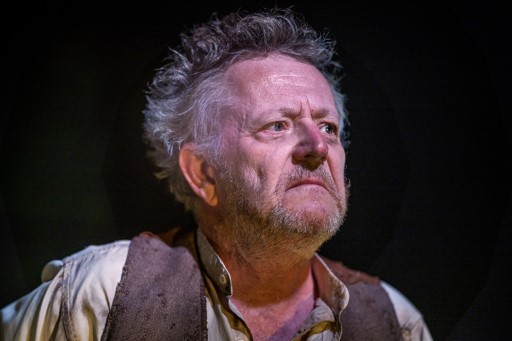Old Fitz Theatre, November 30
9/10
When Jonathan Biggins’ decrepit Krapp grieves for a lost love at the play’s end, it tears at your chest like claws. For this monumental sadness to work, the character must be firmly established as too filled of self-loathing to wallow in self-pity, the miracle being that, at 69, Krapp has not drowned in the solace of whiskey and wine, or died of terror at a life predicated on regret.

Biggins rises to the singular challenges of Samuel Beckett’s one-act, one-man masterpiece. When he performed The Gospel According to Paul (his own play about Paul Keating) he showed he could add pathos to his keen comedic nous, and not dilute the mix with saccharine. But the emotions that trickle through Krapp’s withered veins are finely nuanced and easy to overplay. The actor must spend half the play listening and reacting to the taped voice of Krapp’s conceited 39-year-old self (these tapes having become his surrogate memory); must unearth the inherent theatricality, without letting the gestures and expressions become false.
Gale Edwards’ production has several idiosyncrasies. The young Krapp’s pauses are kept unusually tight, accounting for the crisp, 50-minute duration, and reducing the pressure on Biggins to sustain our interest while doing very little. The decision is not unreasonable: the young Krapp thinks faster and considers less than his older self. Edwards has the character on his feet more, too, and has added such pieces of business as a toilet-flush beginning – referencing both Krapp’s name and his obstreperous bowels. Furthermore, where Beckett stipulates that the desk accommodating the tape-deck be bathed in white light, while the rest of the stage is dark (to echo the Manichean duality between white and black that haunts the play), Edwards and designer Brian Thomson have added a visible upstage wall of floor-to-ceiling filing cabinets. So when Krapp hunts for a banana (his staple food), he needs a ladder to help him ferret among the hoarded rubble of his life. It’s a comedic touch that Beckett, a fan of silent comedy and mime, may well have liked. Less convincing is the decision to let us see Krapp drinking, when the text stipulates this happens out of sight. Krapp’s drinking is guilt-ridden, and should be as private as his bowel movements.

The heavily autobiographical piece has Krapp, a writer, sharing his creator’s love of words: all but dribbling over “spool”, and transfixed by “viduity”. One word above all others leaps from the text, however, and makes you catch your breath. It comes when the younger Krapp eulogises about a woman’s striking eyes. He pauses for the right epithet, and lands upon “chrysolite”. In a play in which adjectives don’t run far beyond light and dark, this is a dazzling blast of colour.
Biggins’s light Irish accent wanders slightly, and after Krapp’s heaviest drinking bout he could become less secure on his feet. But such grumbles are far outweighed by the completeness of his realisation of the character’s fog of disappointment. This spreads across his relationship with his deceased mother, the women who have been the objects of his lusts and infatuations, and, even more thickly, across his relationship with his work. The young Krapp experienced an epiphany that was supposed to light the fire of all his future writing. The old Krapp, knowing his magnum opus sold a mere 17 copies, cannot bear to hear his former presumption and ambition. It could drive a man to drink.
Not to be missed.